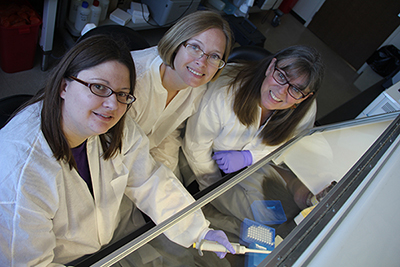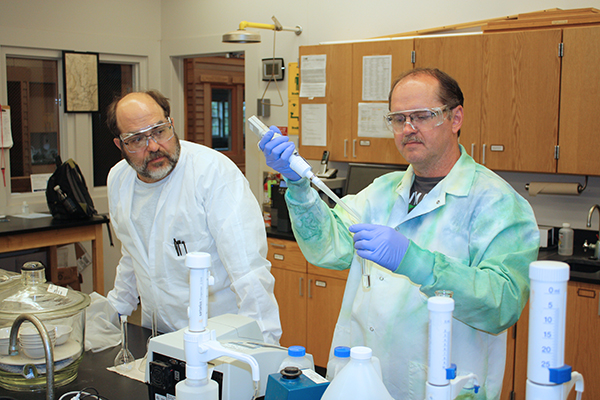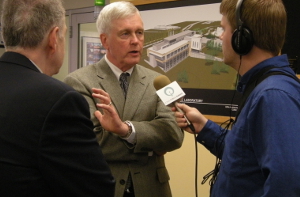Teachers become externs for summer stint

The Governor’s STEM Advisory Council created the program in 2009 to give school teachers experience in real-world applications of courses they teach. The lessons learned in the public health laboratory then may be shared in the classroom to introduce students to STEM careers.
For the first time, two externs are working with Dennis Heimdal, environmental lab specialist at the Iowa Lakeside Laboratory Regents Resource Center in Milford. Water quality is the focus for Marc Benedict from Graettinger-Terril High School in Graettinger and Art Heller from Spirit Lake Community Schools.
Marc Benedict
Benedict teaches all science courses offered by his high school -- physical science, biology, chemistry, physics, environmental science, anatomy/physiology, environmental science, and scientific research and design.
“I am working to develop an activity that would involve my students isolating E. coli from natural water samples, extracting and PCR-amplifying specific parts of the genome and comparing the sequences to known sequences to try to identify the specific animal that was the source of the E. coli.”
PCR (polymerase chain reaction) is a laboratory method used with DNA.
Benedict’s students also will compare their findings to those of the Hygienic Lab as a way to help develop “an understanding of the collaborative nature of science [and] why verification of methods is needed.”
 Art Hellert (left) and Marc Benedict in the Lakeside Lab water chemistry lab
Art Hellert (left) and Marc Benedict in the Lakeside Lab water chemistry lab
Art Hellert
Art Hellert teaches earth science to sixth-, seventh- and eighth-graders. He plans to introduce them to how to use contaminant testing results and data analysis to “critically evaluate the health of the lakes according to this empirical data.”
“The lab's CLAMP (Cooperative Lakes Area Monitoring Project) volunteers collect water samples of the Iowa Great Lakes," Hellert said. “We externs help the lab monitor the water quality for clarity, nitrates, phosphates, dissolved oxygen, chlorophyll [algae], and temperature.
“My students will be using these water quality parameters to graph out transects of the lakes, [conduct a] longitudinal study of temperatures over 46 years and learn what kinds of correlations we can find in the CLAMP data.”
Heather Davidson
Heather Davidson from North Cedar Jr./Sr. High School in Clarence and Lisa Skilang from Linn-Mar High School in Marion are assigned to the Hygienic Laboratory’s headquarters in Coralville.
Davidson leads STEM-related classes, including computer science, game design, and cyber investigation. As a second-year extern, she is building on her 2016 extern experience in the Hygienic Laboratory’s Ambient Air Quality section by following a rotational model that allows her to work in many sections of the lab this summer.
Davidson hopes to gain more knowledge of information age core competencies – known as 21st Century Skills – that students need to succeed and thrive, especially communication and problem-solving that she has seen at work in the lab. Davidson says that her student can expect to use these to overcome computing hurdles.
“They will definitely experience problems when they are coding a new program or game.”
Lisa Skilang
Skilang teaches general biology for ninth- and 10th-graders, and a bioethics class for upper classmen.
For her externship, Skilang initially thought of preparing a class about bioethical decision-making related to work at the Hygienic Laboratory. But her plans changed.
“I am shadowing and learning from various departments, and see many potential applications for both of my classes,” she said.
“One thing that has been quite clear to me is how quickly technology changes in the lab. The progression of testing techniques from culturing, to PCR, to NGS (next generation sequencing) indicates the importance of a STEM-based education.”
Skilang is developing a lesson for her bioethics class about the “ethics of autonomy, control, consent and choice” as illustrated by newborn screening and public health. Other areas of focus include coordination between local health officials and the laboratory related to disease outbreaks and emergency preparedness, and the role of massive amounts of information known as “big data.”
“Bioinformatics is going to be essential to students entering into the field in the future,” Skilang said. “Persistence and working collaboratively are skills that students need to practice as developing solutions to problems requires a pipeline of interactions between multiple agencies and professionals.”



